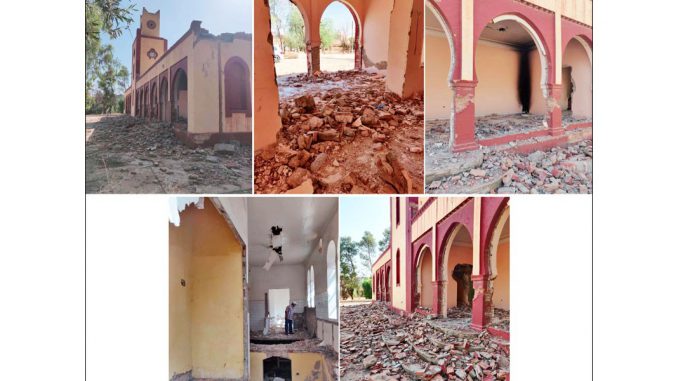
Will we be able to stop the inexorable machine of destruction of one of the oldest vestiges of Oujda’s architectural heritage? Left abandoned, the old officers’ mess of Camp Rose, which has existed since the early 1920s, has been vandalized and most of its accessories and construction materials have been stolen and resold. An alarming observation that has prompted several associations to react and call on all those involved in the protection of public property and architectural heritage. This is the case of the Association Research History and Heritage of Oriental Morocco (ARHPOM) which has just addressed several departments including the Interior, Culture, Housing, the town of Oujda and Justice to react and save what remains of the first mess of officers of the city. ARHPOM says that during the last weeks of September, the former officers’ club, located in the neighborhood of Captain Mohamed Bel Miloudi, was suddenly and quickly subjected to vandalism and theft. Acts that led to a serious deterioration of its internal and external characteristics causing the city to lose part of its architectural memory.
Other associative actors, on social networks, call for a rigorous protection of the city’s tangible and intangible heritage. They also insist on the need to classify, evaluate and protect all buildings dating from the colonial period. “It is time to remedy the constant haemorrhaging of heritage, particularly the city’s architectural heritage, which is of capital importance from a historical and urban planning point of view. Monuments that are part of a collective memory to be preserved”, confided to the Economist Mohammed Chabir, president of an association for the safeguarding of heritage.
The same concern is expressed by Jamal Eddine Tmimi, architect in Oujda. For him, “the heritage of Oujda and its memory are of secondary importance in the face of real estate speculation and opportunities for urbanization of the city without cultural and civilizational added value”.
It remains to be said that the officers’ mess of Oujda is located in the urban center, an area that has tens of hectares dedicated to the construction of high standing buildings and which is currently undergoing work to equip basic infrastructure.
The 5th edition of the Festival of El Kelaâ des Sraghna of popular arts, organized this year in “virtual format” ended Monday, with the presentation of musical performances reflecting the authenticity of these arts at the provincial level.
Lovers of authentic heritage had an appointment, from October 8 to 12, with an artistic genre of the most popular at the provincial level, namely Abidat Rma with the troupe Ouled Tassaout, led by Fayçal Faouzi.
The public also appreciated the artistic performance of the troupe “Laâbate Kelaâ des Sraghna”, another artistic genre also very popular in the province. This festival set itself the mission of paying tribute to the pioneers of popular arts in this part of the national territory, support them morally and materially in the context of the current health crisis and the socio-economic and cultural changes imposed by modernity, he said. This festival was initiated by “Dar Attakafa” (House of Culture) in coordination with the Regional Directorate of Culture of Marrakech-Safi, and in partnership with the association “Angham” for music.
The Aicha Association for Proximity Development and Environment, based at the Oasis of “Oumifiss” in the commune of Laqsabi (province of Guelmim), has obtained consultative status with the Economic and Social Council of the United Nations (ECOSOC). This status will enable the association to make representations to the United Nations bodies, the Global Environment Facility and the Green Climate Fund, said MAP’s president, Mohamed Mostafa Bendaoud.
It is also, he added, to weave international partnerships in the field of environment and the fight against the effects of drought, especially since the mission of this NGO, founded in 2005, is to improve living standards in the oasis areas of southern Morocco. It does this by creating modern oases and diversifying income-generating activities (IGA) based on the creation of forests with drought-resistant tree species.
The NGO relies on volunteerism, innovation, respect, team spirit and international solidarity as human values that can help achieve ecological balance to ensure a healthy life for future generations.

Be the first to comment